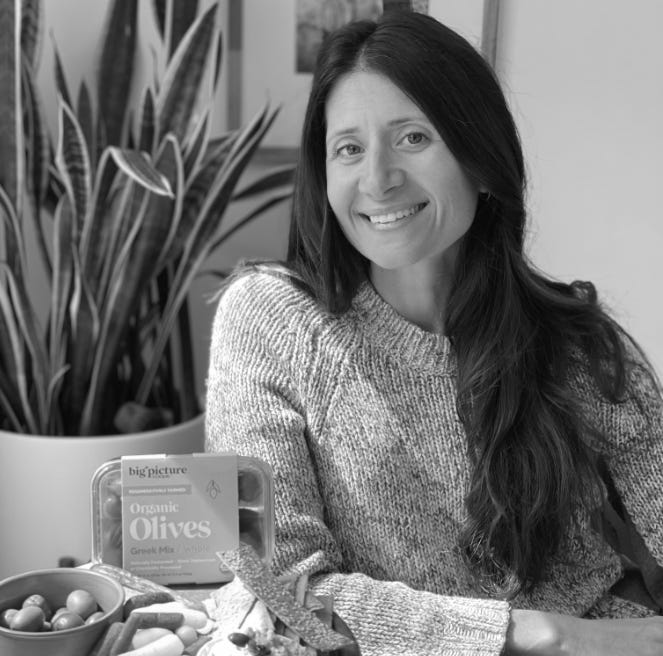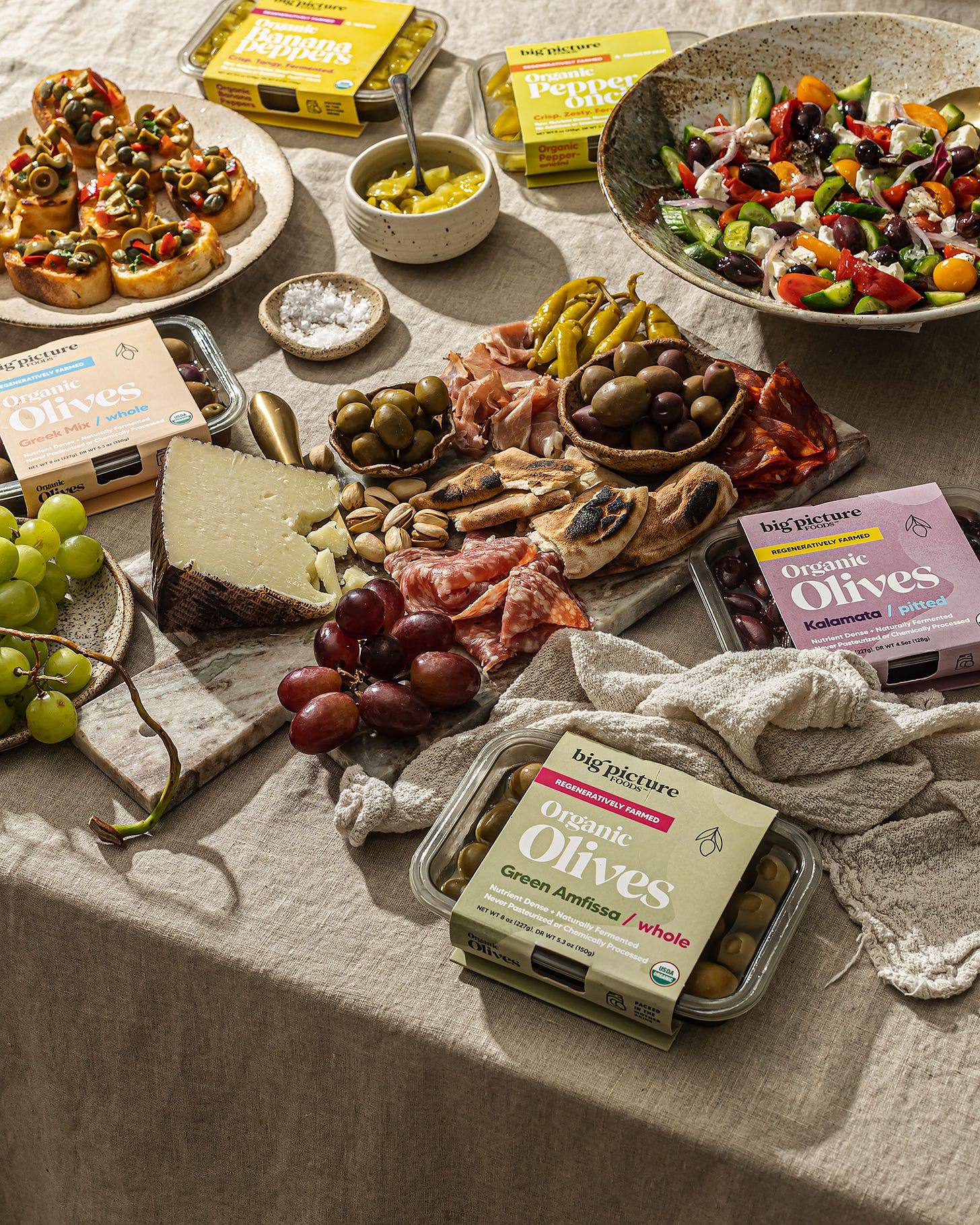Daniela Jensen is rebuilding the commodity supply chain
How the co-founder of Big Picture Foods is changing the food system, regenerative farming, and more.
Why hello there! Welcome to on hand! If you’ve landed here and somehow aren’t subscribed, you can do so here.
Big Picture Foods is a pantry staple brand that’s on a mission to change the food system through what we eat. With a focus on regenerative farming, their olives, peppers, and capers are sustainably grown and slow-cured to pack the biggest nutritional punch.
I chatted with co-founder, Daniela Jensen, on how Big Picture Foods is changing the food system, regenerative farming, and more.
Brianna Plaza: Do you want to start by telling me a bit about your background and how you got into this particular spot in the food space?
Daniela Jensen: My background in college was communication design, and I started fresh out of school at an agency up in Boston called Modernista. I really loved working there — we were doing really glitzy, fun campaigns. From there, my career kind of pivoted and I took a job at Hasbro Toys working on the Play School business. I was crafting strategies for how to get moms to understand the benefits of learning through play. Then when I had my youngest daughter, I started my own juvenile products company, which really came out of a need. I became obsessed with the practice of skin-to-skin contact and founded a business that supported mom and baby through attachment parenting. I got into this space because of nurturing and holistic thinking, which is a natural segue to food.
Just before Big Picture Foods, I was at a prenatal vitamin company working on communicating the benefits of nutrition throughout pregnancy and postpartum. And then when the pandemic hit, my husband and I, who also worked at Modernista with me, saw the opportunity to further connect some of these dots. He was on the sourcing side of things at Blue Marble Brands running a $175 million portfolio of natural and organic brands. We saw this opportunity to go further and to do better. So here we are.
Brianna Plaza: Why did you decide to focus on these particular products?
Daniela Jensen: So we started with more of the “dirty” and “deceptive” categories in grocery because there's a huge opportunity to educate people.
But why olives? All olives have to be cured before they can be eaten. You can't eat a olive straight off of a tree. It has this super bitter compound called oleuropein. The old world way of curing olives was just water and salt, whether that salt was dry rubbed or it was in a salt water brine, the salt naturally fermented the products. And unfortunately today, most olives are cured with chemicals, which you'll never see on any of the ingredient panels because it's part of the process and not an ingredient.
So I think there's a really unique opportunity to educate consumers and build the brand. We're playing in a variety of channels. You'll find us in 600 grocery stores throughout the country. We're also partnering with food service, so we’re proud to be the provider of banana peppers for Sweetgreen.
Brianna Plaza: How did the partnership with Sweetgreen come about? I have to imagine it's hard to get in with them.
Daniela Jensen: They are the dream partner for natural product companies, purely because they've built their brand ethos on strong sourcing standards. I think that they're a testament to everyone in the market who is communicating quality through “Better for You” products, and that starts with sourcing.
We met them at a trade show, and they just loved what we were doing. I think our mission really resonated well with them. They're also also looking for brands that have a climate positive impact. That's another thing that they are communicating around food. I think that the two of us run parallel goals of trying to reinvent what our food system can look like — them in the fast casual space and us on the procurement side.
Brianna Plaza: With regards to the banana peppers, I know that’s of particular interest because yours are the only organic option. Can you talk a little bit about why those peppers are so hard to be organic?
Daniela Jensen: So let's start with the nutrient collapse in our food system, which is wild to me. As the person who's responsible for putting food on the table for my family, I became hyper aware of what I was buying at the store and I was reading ingredient lists.
I think a lot of people find themselves in this situation. They want to know where their food comes from and they want to know how their food was both grown and cured. The stats are mind-boggling in terms of what we're doing to the soil. By tilling, spraying, and industrial processing, we're destroying any nutrient value that our soil has. We're killing all of the life in the soil, and if you don't have nutrients in your soil, you can't have them in your food.
Today, you have to eat eight oranges to get the same vitamins and minerals our grandparents got from one. With apples, it's like 29*. It's crazy to think that our fruits and vegetables no longer nourish us the way that they used to, and that's largely because of the health of the soil. And when you think about growing food in these industrial, commodity, conventional ways, everything is a race to the bottom.
We are proud to be the only organic banana pepper on the market. That’s because it requires time and skill and patience, and most companies forego all of those things. That’s the sad reality.
Brianna Plaza: Your products are based on regenerative farming, but by design, that's smaller scale. How do you think about growth and scaling as a business when your products are designed not to be massive commodity products?
Daniela Jensen: We've rethought the entire commodity supply chain so that we could bring better food to more people. And that starts with how we partner with our farmers. We’ll go with the olive example. Most olives are bought using “spot buying.” So if I am a brand that wants to bring an olive to market, I am going to an aggregator and I'm purchasing what they have. And that aggregator has probably gone to a variety of different farmers, bought their olives, and taken them to a central processing facility. They’ve sorted them by size and by trait, and then I'm purchasing based on those attributes, whether I want a certain size or a variety. But then all traceability and all transparency is lost. And as a result, the farmer really gets squeezed. In true commodity fashion, they’re beholden to that day's price.
What we do is flip that on its head. We work direct with our farmers. We take out all of the middlemen. They both grow and cure the products onsite for us. We buy their full yield so that when you open a tray of Big Picture olives, you're going to see a variety of sizes and you're going to know that they all came from that same grove. That they were harvested at that same time.
And I think there's a curiosity that comes from eating foods like that. There's a terroir that's associated with these types of foods, much like a natural wine. Think about the way that a wine is produced. Our olives follow a similar process. They use only the wild native cultures, which gives the food a certain flavor that varies, and I think true foodies can really appreciate the artisan qualities of that. It's exciting to be able to take what's typically a very commoditized product and put “special” back into it.
Brianna Plaza: As a specialty product that also has this mission of alleviating climate change and changing the commodity system, it's more expensive than many grocery brands. How do you think about that relationship between the rightful costs of your products and bringing them to more consumers to affect a bigger change?
Daniela Jensen: So we're never going to be the olives in a can that you can buy for 99 cents at the grocery store. That said, we're really excited to be able to compete. A tray of our olives are $5.99 for a regenerative, organic-certified product, and that is on par with what you'll get from a brand like Divina.
We’re working to reconstruct the food system, support farmers, and have a really strong environmental impact. Our olive groves store one ton of carbon per acre versus the conventional equivalent that release 1/3 of a ton of carbon back into the atmosphere*.
We're making a meaningful change by taking out all of the middlemen and working direct with our farmers, and that gives us favorable pricing. Our farmers grow and ferment the products for us. Yes, there's an artisan craft to it, but they're being paid dual income to do so. So we're driving social change in doing that. We've really rethought every possible opportunity for how we can bring these products to market in a way that benefits everyone. It benefits eaters, it benefits farmers, it benefits the planet.
As we were building the brand and we were working through this, we kept coming back to, it's part of the big picture, and it's inherent in our brand name now. So it stays true to that mission.
Source links:
https://www.scientificamerican.com/article/soil-depletion-and-nutrition-loss/





